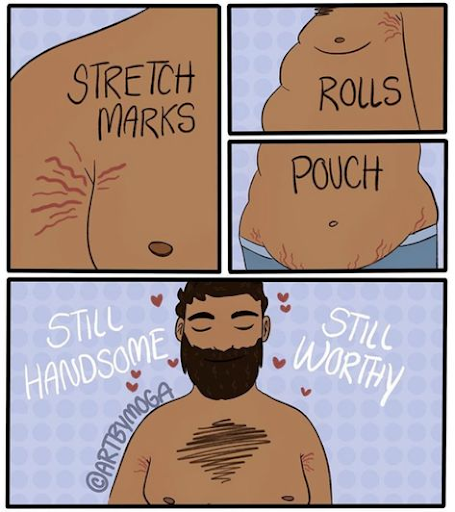Redefining Beauty: The Crucial Role of Parents
If there is one conversation that matters, it is, about how parents can make or break their child’s self-love and confidence about their body. Body Image refers to the different feelings and thoughts that we have about our body. These thoughts can range from positive to negative or a combination of both depending on the experiences that one has. The concept of body dysmorphia or having a negative body image has affected people across all genders, races, and backgrounds, some more or less in comparison.
In this blog, we will delve into the intricate relationship between body image and parenting. We will explore how parents can either empower their children to develop a healthy and positive body image or, unintentionally, contribute to negative perceptions and self-esteem issues.

Why does it manifest?
We must understand that the causes of body image issues can be both complex and interrelated. So let’s break them down:
- Experiencing teasing or bullying related to one’s appearance or weight during childhood.
- Having family and friends who are engaged in dieting and openly express dissatisfaction with their bodies.
- Living in a culture that tends to judge individuals based on their physical appearance.
- Facing peer pressure, especially among girls and women, to conform to slim body ideals, engage in dieting, exercise rigorously, and make constant comparisons with others.
- Being exposed to media and advertising that promote specific appearance standards.
- Internalizing society’s ideals regarding appearance and body image.
- The prevalence of media content aimed at women and girls that encourages dieting and weight loss programs.
- Possessing perfectionistic tendencies, characterized by rigid and all-or-nothing thinking, which can heighten the risk of body dissatisfaction, within ourselves.
What are the signs?
A negative Body image can manifest in several ways. Here are some of how we can notice them:
- Repetitive Dieting Behaviour – Engaging in extreme or unhealthy dieting behaviours, such as crash diets or excessive exercise, in an attempt to change our body shape or size. Developing unhealthy eating patterns, such as binge eating, emotional eating, or restrictive eating, in an attempt to control weight and appearance.
- Negative Self Talk or Self Surveillance – Constantly criticizing one’s own appearance, making disparaging comments about one’s body, or expressing dissatisfaction with how one looks.
- Unrealistic Body Goals – Setting unrealistic body goals for ourselves and constantly striving to achieve them, can lead to frustration and disappointment.
- Depression and Anxiety: Experiencing symptoms of depression and anxiety related to body image, such as social withdrawal, mood swings, or persistent sadness.

How do my parents contribute to my negative body image?
Parents or any guardian play a very significant role in either for positive or a negative body image in our lives. As our primary caregivers, they play an important role in shaping our attitude toward our body. Our parents influence many aspects of our lives, from our favourite activities and political beliefs to our food preferences. This influence extends to our perceptions of weight and how we maintain our fitness. When our parents openly express
concerns about losing weight, engaging in dieting, or exhibiting a visibly poor body image, impressionable children often adopt these attitudes, sometimes projecting them onto themselves. This cycle typically initiates in childhood but can persist into adulthood.
We can all agree that having a messed-up view of your body and being fixated on weight are big players in causing a bunch of eating disorders. And get this – parents, whether they realize it or not, can affect their kids in this department. If parents are always focused on losing weight or have weird eating habits, it can mess with their kids. Like, if they’re all critical about their kid’s weight or force them into dieting, it’s not great for their self-esteem and can mess up how they deal with food.
But even if it’s not so direct, it still matters. If a kid sees their parent obsessing over counting calories, they might end up doing the same thing when they grow up. It’s like a ripple effect from childhood to being a grown-up. So, YES, parents, your attitude about weight and eating can seriously shape your kid’s relationship with their body and food.
Conclusion
But how can parents do better? PARENTS TAKE NOTE!
- Promote Healthy Choices: Parents should encourage children to make choices that prioritize their overall well-being, such as listening to their body’s cues for hunger and fullness, getting enough rest, and managing stress in healthy ways.
- Encourage Open Communication: Creating a safe and non-judgmental environment where children feel comfortable discussing their thoughts, concerns, and questions about their bodies and self-esteem is important, as a guardian and caregiver.
- Promote Self-Compassion: Teach your children to be kind and forgiving to themselves, particularly when they face challenges or make mistakes. Encourage them to focus on self-worth beyond physical attributes.
- Positive Reinforcement: Offer praise and positive feedback related to children’s achievements, character, kindness, and intelligence, rather than focusing on their appearance.
Parents can shape their children’s positive body image by fostering self-worth, teaching self-acceptance, and providing love and support. This ongoing process empowers children to navigate societal beauty standards with confidence and positivity, promoting a lifetime of well-being and self-assuredness.
Author

